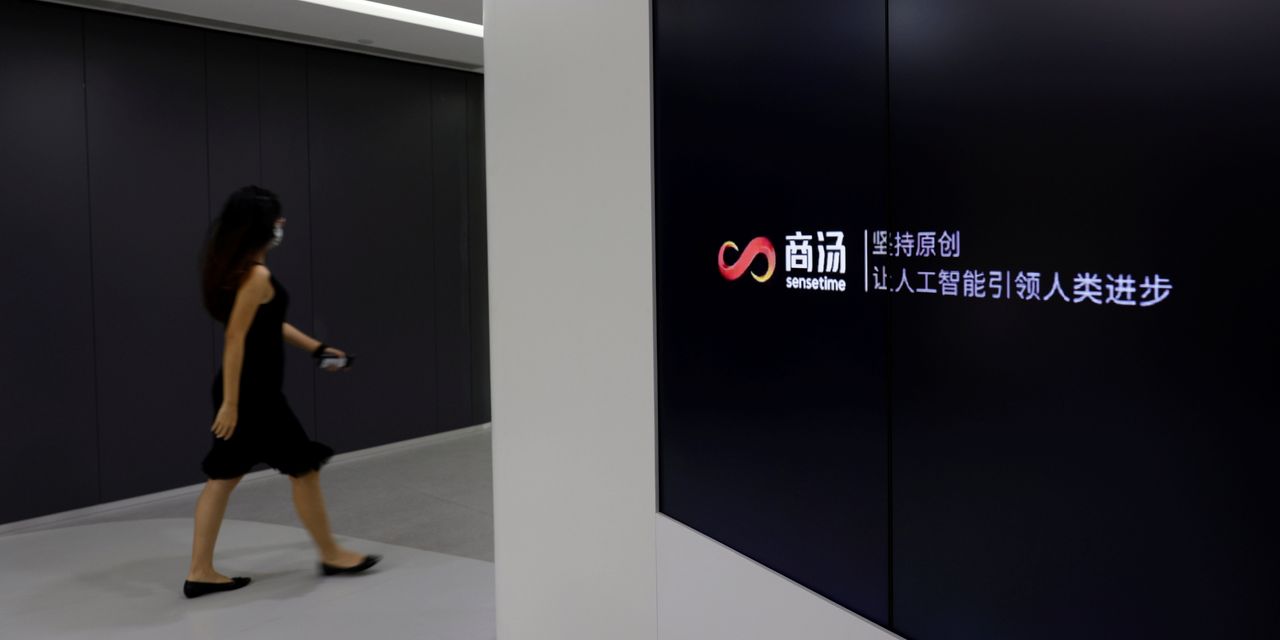
Chinese artificial-intelligence company SenseTime Group Inc. said it would postpone its Hong Kong initial public offering, days after it was added to an investment blacklist of companies that the U.S. government says are supporting Chinese military development.
In a statement, the company said the halt was meant to help investors consider the potential impact of the U.S. blacklisting, adding that it remains committed to completing the listing soon. The postponement comes after the company held off from pricing its IPO as planned on Friday.
The company is planning to relaunch the deal as soon as this month, according to people familiar with the matter.
SenseTime, whose products are used in smart cities, police surveillance and autonomous driving, had planned to raise as much as $767 million in an initial share sale on the Hong Kong stock exchange and list on Dec. 17.
On Friday, the U.S. Treasury Department named SenseTime among 25 individuals and entities that it said were connected to “human rights abuse and repression in several countries around the globe,” and added it to a list of companies that it says are supporting China’s military.
U.S. authorities cited the use of SenseTime’s facial-recognition technology in China’s effort to suppress and assimilate mainly Muslim ethnic minorities in western China. The designation prevents Americans from investing in the company. On Saturday, SenseTime said the accusation was baseless and reflected “a fundamental misunderstanding of our company.”
SenseTime counts SoftBank Group Corp.’s Vision Fund, Qualcomm Inc. and Alibaba Group Holding Ltd. among its shareholders and is one of the world’s most valuable artificial intelligence startups.
The IPO was already a hard sell to international investors, owing to a SenseTime subsidiary’s designation on a Department of Commerce export-control list two years ago.
At the time, SenseTime said the company abided by all relevant laws and regulations in the places in which it operated. SenseTime said in its prospectus that even though its Beijing subsidiary was added to the U.S. Entity List, the restrictions “do not apply to other entities within the group that are legally distinct” from that unit.
The deal size was downsized from a target of $2 billion and represented a fraction of the billions of dollars of private funding that the company received in the years since its inception.
In the original IPO, cornerstone investors made up of mainland China- and Hong Kong-based institutions had committed to purchase 60% of the new shares being issued. The temporary withdrawal of the deal means the company has to re-sign commitments with these investors.
The latest U.S. blacklisting sparked expressions of patriotic sentiment on Chinese social media. Some users said they would buy SenseTime’s stock to show support.
In Monday’s statement, SenseTime said it would publish a new prospectus with a revised listing timetable. The firm is incorporated in Hong Kong and has offices in locations including Shanghai, Beijing, Singapore and Japan.
Other Chinese companies have been caught up in political friction between the governments of the world’s two largest economies. Several, including Chinese telecoms China Mobile Ltd. and China Telecom Corp., have been delisted from the New York Stock Exchange after former U.S. President Donald Trump put the companies on the same investment blacklist.
Megvii Technology Ltd., a domestic rival of SenseTime’s, scrapped its Hong Kong IPO plan after being added to the export blacklist and is applying for a listing on Shanghai Stock Exchange’s STAR Market.
Technology is the one sector in China that is likely to be subject to the hardest-edge approaches by U.S. authorities, as there is widespread consensus among U.S. politicians that China’s technological growth needs to be checked for national-security and competitive reasons, said Paul Haenle, a former White House National Security Council China director.
On Thursday, the Uyghur Tribunal, a U.K.-based panel of lawyers, academics and activists, wrapped up a yearlong investigation into China’s treatment of Uyghurs and other ethnic minorities in the western region of Xinjiang, saying China’s policies in Xinjiang amounted to a form of genocide. The U.S. has labeled China’s actions there “genocide and crimes against humanity” against the Uyghur ethnic group.
The U.S. has also raised concerns about China’s military buildup in recent years, with Beijing ratcheting up its military activities around Taiwan and in the South China Sea.
In an annual report by the U.S. Department of Defense to Congress this year, the agency wrote that China’s commercial sector increasingly drives breakthroughs in advanced dual-use technologies, which have both civilian and military applications.
Leaders from China’s military, the People’s Liberation Army, have spoken about how AI is crucial to the modernization of its military. The PLA likely spends at least $1.6 billion each year on AI-related systems and equipment, according to an October estimate by researchers from Georgetown University’s Center for Security and Emerging Technology.
SenseTime was previously named as a member of China’s official AI national team by the country’s Ministry of Science and Technology.
—Rebecca Feng contributed to this article.
Write to Liza Lin at [email protected] and Jing Yang at [email protected]
Copyright ©2021 Dow Jones & Company, Inc. All Rights Reserved. 87990cbe856818d5eddac44c7b1cdeb8








